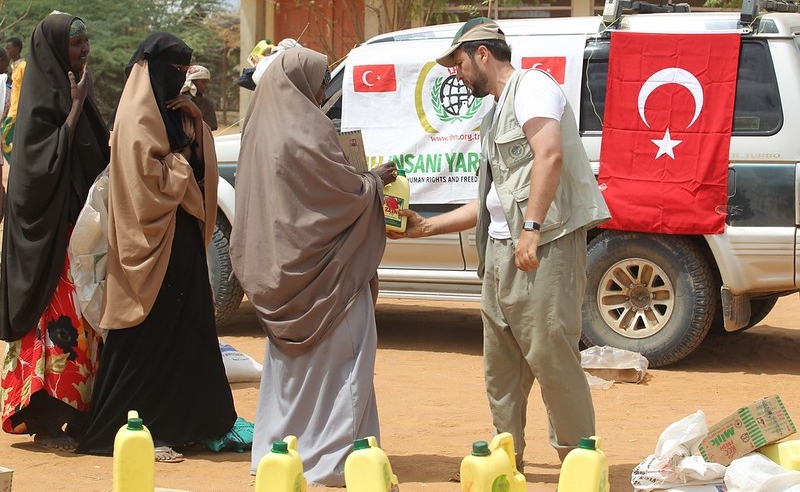Turkey’s Approach to Poverty in East Africa
 For decades, East Africa has struggled with harsh famines, conflicts and involuntary displacements. Traditionally, nations like the United States (U.S.), the United Kingdom (U.K.) and China have intervened to support stability and poverty alleviation in the region. However, Turkey has emerged as a significant, albeit less publicized, contributor to humanitarian and development efforts in East Africa. In 2023 alone, Turkey invested more than $85.5 billion in infrastructure projects across Africa, with President Recep Tayyip Erdoğan making 30 official visits to the continent, symbolising Turkey’s deep ties to the continent and its commitment to poverty reduction.
For decades, East Africa has struggled with harsh famines, conflicts and involuntary displacements. Traditionally, nations like the United States (U.S.), the United Kingdom (U.K.) and China have intervened to support stability and poverty alleviation in the region. However, Turkey has emerged as a significant, albeit less publicized, contributor to humanitarian and development efforts in East Africa. In 2023 alone, Turkey invested more than $85.5 billion in infrastructure projects across Africa, with President Recep Tayyip Erdoğan making 30 official visits to the continent, symbolising Turkey’s deep ties to the continent and its commitment to poverty reduction.
Historical Ties to East Africa
Turkey’s engagement with East Africa dates back to the Ottoman Empire, particularly in the Horn of Africa and around the Red Sea. These historical connections, coupled with shared Islamic traditions, have fostered strong cultural bonds. Reflecting this relationship, the Turkish Cooperation and Coordination Agency (TİKA) provided food aid to approximately 500 families in Ethiopia’s Lege T’afo refugee camp during Ramadan in 2025. In addition, Turkey has adopted an aid model dissimilar to other traditional foreign powers operating in East Africa, such as China and European countries. Ankara’s aid focuses on a noninterventionist approach, which provides humanitarian support and poverty relief without interfering in the political system or democracy of the recipient country.
Past Efforts
In 2005, Turkey announced the “Year of Africa,” marking a significant shift in its foreign policy toward several African countries. This support for East Africa became apparent in 2011 when Somalia suffered a widespread famine, resulting in the death of 260,000 people. Shortly after, Ankara committed more than $1 billion to humanitarian and development assistance. What’s more, between 1992 and 2018, Turkey awarded a total of 1,092 scholarships to Somali students, demonstrating a commitment to providing opportunities for talent from developing nations in East Africa.
Present Efforts
TIKA, active in 170 countries, has expanded its variety of operations in East Africa, investing in health care such as the De Martino hospital in Somalia, which has received lifesaving neonatal incubators, stretchers and defibrillators. Other organizations of Turkish origin, such as the Türkiye Diyanet Foundation, have made important contributions to poverty reduction in East Africa, such as the construction of a high-tech solar-powered well in Ethiopia, which has a 5000-litre tank and has helped reduce the effects of drought and food insecurity in the village of Fadis.
Turkish Airlines
Apart from the government’s direct support for alleviating poverty through TIKA, other Turkish organisations and institutions, attached to Ankara, contribute to poverty alleviation in East Africa. Turkish Airlines, for example, plays a vital role in connecting some of Africa’s most isolated nations with Europe. According to the United Nations’ (U.N.) list of the 46 least developed countries, Turkish Airlines flies to 25 of them, providing more opportunities for global investment in these countries, consequently tackling the issue of poverty. The airline has committed to the U.N.’s Sustainable Development Goals for 2030, prioritizing poverty alleviation and zero hunger.
Looking Ahead
Turkey’s approach to poverty reduction in East Africa is characterized by a blend of humanitarian aid, infrastructure development and cultural engagement. Through organizations like TİKA and TDV, Turkey addresses immediate needs while investing in long-term solutions such as education and economic development. This comprehensive strategy underscores Turkey’s role as a key partner in East Africa’s pursuit of sustainable growth and stability.
– Alfie Williams-Hughes
Alfie is based in Nottingham, UK and focuses on Business and Politics for The Borgen Project.
Photo: Flickr
